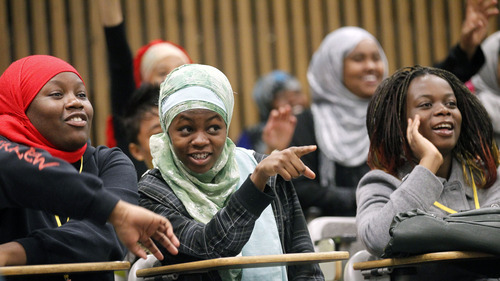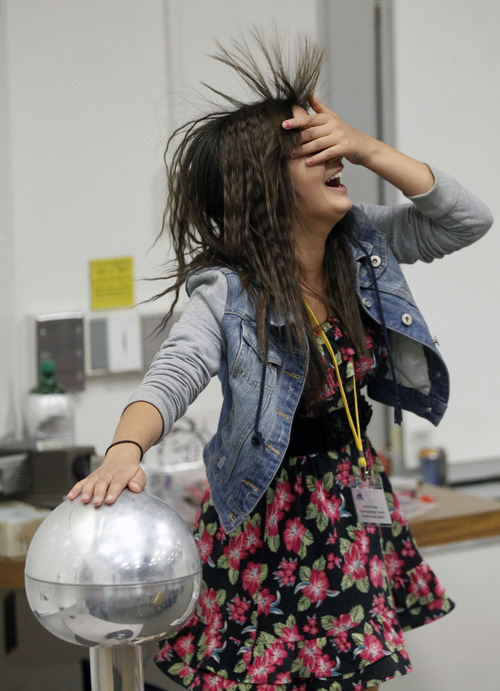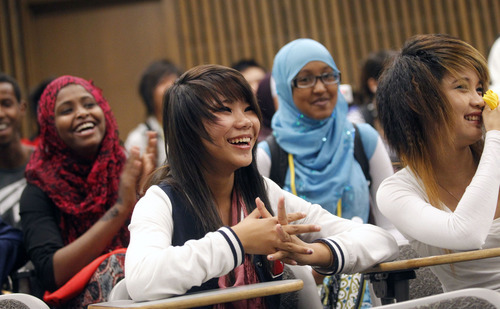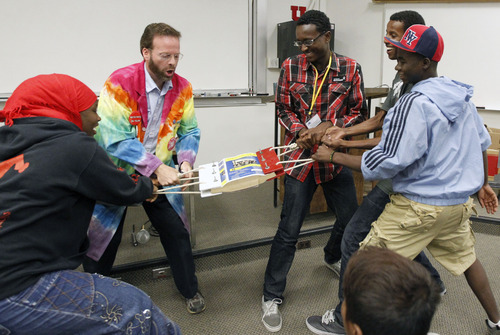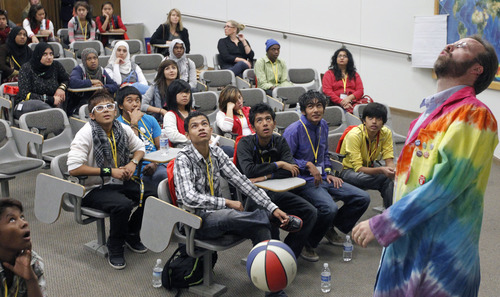This is an archived article that was published on sltrib.com in 2012, and information in the article may be outdated. It is provided only for personal research purposes and may not be reprinted.
Mohamud Shego, 16, recently came to Utah from Atlanta, Ga., where he lived for 10 years after fleeing Kenya as a young refugee. Shego is now a sophomore at Cottonwood High School. He loves learning and being a role model for his peers, but he's forced to watch as some of his struggling refugee friends drop out of high school.
"I want them to succeed and have a better life," Shego said. "But I mean, it's what it is. Everybody has their own future."
In Utah — where about 1,000 new refugees are resettled each year — young refugees are dropped right into high school.
Although many have had little experience with a classroom structure before, refugee students still start as juniors when they are 16 and 17 upon arrival in the U.S., said Kendrick LaFleur from the Refugee Services Office at the Department of Workforce Services.
The student refugees are also expected to pass math and English proficiency tests that they are doomed to fail, LaFleur said, especially if they've only been in the country for a year. Because of these and many other struggles, student refugees often do not graduate from high school and pursue a higher education.
That's why LaFleur and the Refugee Services Office, along with encouragement and aid from sponsors and the Canyons, Salt Lake and Granite school districts, put together the Annual Utah Refugee Youth Conference, which began in 2011 and took place again on Friday at the University of Utah.
More than 200 student refugees from a number of high schools, including Cottonwood, Kearns and East, came to the conference to meet role models, receive encouragement and learn about the importance of education.
"The whole purpose of the conference was to try to encourage our kids to consider furthering their education," LaFleur said. "Last year Cottonwood [High] reported they had more refugees graduate than ever before. In the Granite School District we're seeing that trend, and we want to ride that trend and get freshmen and sophomores starting to realize that if they plan ahead they can be ready."
Another key component of the conference, though, was connecting the young refugees with positive role models with whom they could identify, said Analis Ruiz, the chair of the conference committee and an administrator for student advocacy at Canyons School District.
Ruiz said, "This is probably one of the few opportunities where they can come together and know that they have options, that there are people out there that have [made] it because they have had options."
Ruiz referred to the speakers and session leaders at the conference who donated their time with the kids. The day consisted of a speech from Roderic Land, an assistant professor at the U., as well as three breakout sessions from Adam Beehler, physics demonstration specialist for the U.; Jamal Willis, former BYU and NFL 49er football player and civil rights educator, and Moises Prospero, a former U. professor at the Utah Criminal Justice Center. The conference concluded with a "college walk" where representatives from colleges from across the state answered questions and provided resources.
Evidence of the speakers' success manifested when the students would unexpectedly burst into applause while they spoke.
One of these times was when the keynote speaker, Land, said, "Don't let anybody — I don't care if it's your mother, your father, your teacher, your counselors, principals, whoever — don't let anybody tell you what you cannot be and/or do, right?"
Land was told by one of his teachers in high school that he should not pursue law, but rather, he should pursue something along the lines of manual labor.
To that he responds many years later, "You have the power to determine your future. ... That power is in your hands."
The students were also particularly inspired by former football player Willis.
Willis grew up in Las Vegas where, he said, conditions were rough.
"I lived somewhat in the ghetto where if I wanted to be a gang member I could have walked outside and did it. If I wanted to sell drugs I could have gone outside and did it."
Willis shared a variety of personal stories with the students, including telling them while growing up he was physically abused by his uncle, he watched his cousins sentenced to jail for murder and selling drugs, and he also saw one of his friends shot and killed in a fight at high school.
The students surprised Willis when they burst into applause after he said, "I don't care what circumstances you have at home because I had the same circumstances. ... But you know something in my mind, it was just I wanted to be successful. I wanted to be somebody. I didn't want to be like my friends [and] my cousins in jail."
Willis' goal was to encourage the students to develop and give of their talents to others.
"I've learned as I got older, success is about happiness, it's about walking out of your door every day knowing that you don't have to watch your back, knowing that you've got food on the table," he said. "But at some point, it ain't about you. ... It was all about me until I got older, until I could understand and learn it's not about me. You've got to give a little bit. You can't take it all, you've got to give."
Shego, for one, said he was encourage by the conference and will return to Cottonwood High with renewed hopes for the future.
"I just want to go to college ... and do what I can to help my family, my friends and myself and everyone else around me," said Shego.
Twitter: @justiola —
Refugees in Utah
About 25,000 refugees live in Utah, 99 percent of whom are in the Salt Lake Valley. Between 1,000 and 1,100 new refugees arrive in the state each year. The largest refugee communities are from Somalia, Sudan and Iraq. About 5,000 people from each of those countries have resettled in Utah.
The refugee groups arriving most rapidly in Utah now are from Iraq, Burma, Somalia and Bhutan.
Source: State of Utah Refugee Office, http://refugee.utah.gov/


